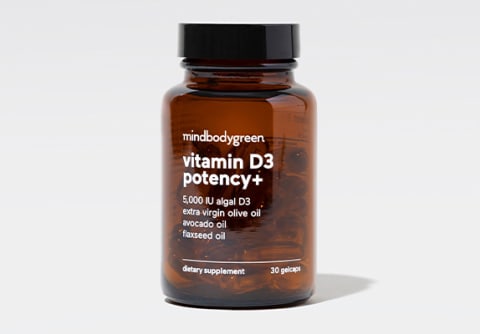Lower Your Risk Of Cancer 24% By Getting Enough Of This Essential Vitamin
The complicated relationship of vitamin D and disease.

Advertisement
This ad is displayed using third party content and we do not control its accessibility features.
Advertisement
This ad is displayed using third party content and we do not control its accessibility features.
Image by Michela Ravasio / Stocksy August 13, 2024 Evidence suggests that increasing your vitamin D intake can help reduce your risk of developing cancer and autoimmune diseases (yes, really!), but a JAMA cohort study indicates this seemingly simple solution isn't so cut and dried. According to the research, body composition (i.e., as measured by weight, body fat percentage, BMI, and waist circumference) plays a massive role in how much vitamin D1 your body actively circulates—and, subsequently, impacts the cancer research previously determined.
How vitamin D status impacts cancer risk
This post hoc analysis of the VITAL study—which evaluated the influence of vitamin D and omega-3 intake on cancer, heart disease, and stroke risk—set out to discover whether body composition played a part in this relationship.
This was inspired by the significant preventive results found in participants with "normal" BMI at the baseline that increased their vitamin D intake but not those with overweight or obesity. These included:
The cohort study analyzed a subset of 16,515 participants from the VITAL study and found that vitamin D levels increased less over a two-year period in participants with higher BMI. Researchers hypothesize that this is due to a blunted metabolism and lowered amount of circulating (i.e., active) vitamin D in the blood in individuals with overweight or obesity.
Evidence shows a clear inverse relationship between adipose tissue and vitamin D status2, and this correlation subsequently impacts the likelihood that individuals with higher BMIs may reap the proactive health benefits demonstrated in previous studies (e.g., reduced cancer risk, cancer mortality, and autoimmune disease prevalence).
Does evidence show that maintaining healthy vitamin D levels can help reduce the likelihood of developing cancer or an autoimmune disease? Yes. However, current research also indicates that your body composition plays a massive role in how much vitamin D is stored in your adipose tissue (i.e., your body fat) versus the amount available for your cells to use.
The takeaway
To reap optimal longevity benefits detailed in this study, reaching and maintaining healthy vitamin D status is key. And research shows the best way to achieve vitamin D sufficiency is with a premium high-potency vitamin D supplement. (Hint: You can find mindbodygreen's top picks here.)
Watch Next
Enjoy some of our favorite clips from classes
Watch Next
Enjoy some of our favorite clips from classes
What Is Meditation?
Mindfulness/Spirituality | Light Watkins
Box Breathing
Mindfulness/Spirituality | Gwen Dittmar
What Breathwork Can Address
Mindfulness/Spirituality | Gwen Dittmar
The 8 Limbs of Yoga - What is Asana?
Yoga | Caley Alyssa
Two Standing Postures to Open Up Tight Hips
Yoga | Caley Alyssa
How Plants Can Optimize Athletic Performance
Nutrition | Rich Roll
What to Eat Before a Workout
Nutrition | Rich Roll
How Ayurveda Helps Us Navigate Modern Life
Nutrition | Sahara Rose
Messages About Love & Relationships
Love & Relationships | Esther Perel
Love Languages
Love & Relationships | Esther Perel
What Breathwork Can Address
The 8 Limbs of Yoga - What is Asana?
Two Standing Postures to Open Up Tight Hips
How Plants Can Optimize Athletic Performance
What to Eat Before a Workout
How Ayurveda Helps Us Navigate Modern Life
Messages About Love & Relationships
Advertisement
This ad is displayed using third party content and we do not control its accessibility features.
Advertisement
This ad is displayed using third party content and we do not control its accessibility features.
Advertisement
This ad is displayed using third party content and we do not control its accessibility features.

 FrankLin
FrankLin 






























.jpg&h=630&w=1200&q=100&v=f776164e2b&c=1)


